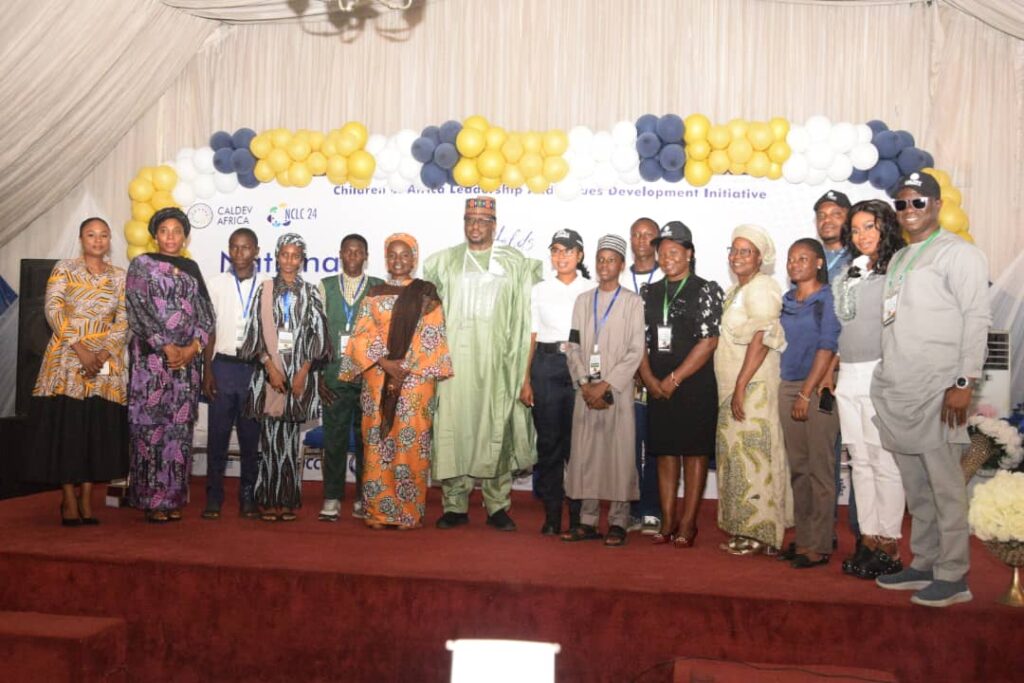By Gloria Ikibah
The Nigerian Children’s Parliament has called on the Federal Government to reinvest a significant portion of the savings from the removal of petroleum subsidies into the education sector.
The children also emphasised the importance of prioritizing infrastructure development, capacity building, and hiring qualified educators to ensure better access to quality education for all Nigerians in the 2025 budget.
The Parliament also recommended allocating 50 per cent of the savings to revitalize the healthcare sector, particularly focusing on maternal and child health services, as they argued it would reduce mortality rates and provide affordable, accessible healthcare for vulnerable populations.
These were the resolutions at the session, presided over by Deputy Speaker Ibrahim Zanna, a highlight of the National Children Leadership Conference organized by the Children of Africa and Values Development Initiative in Abuja.
The Children’s Parliament advocated for the creation of programs targeting nutritional, psychological, and social needs to address broader welfare concerns, and suggested funding school feeding initiatives, child protection services, and promoting child rights. They emphasized that these measures would enhance the lives of Nigeria’s 58 million vulnerable children who currently face challenges like malnutrition, lack of healthcare, and limited access to education.
They further urged the government to establish a transparent framework to track and publicly report the expenditure of subsidy savings. This would involve setting clear targets and measurable outcomes to build trust among citizens, especially children. Collaboration with civil society organizations, international partners, and local stakeholders was also recommended to maximize the funds’ impact and achieve sustainable, inclusive development.
The Parliament further called for functional Children’s Parliaments to be established at all levels of government. They proposed adopting the CALDEV Africa National Children Leadership Conference as a model program to nurture leadership skills among young Nigerians.
These resolutions were part of a motion titled “Urgent Need for the Nigerian Government to Reinvest Savings from the Removal of Petroleum Subsidy into the Education, Health, and Welfare of Children for Sustainable Development,” moved by the Leader of the Parliament, Ubkongyamba Hassan.
The Parliament acknowledged that removing the petroleum subsidy was a necessary step to alleviate fiscal pressure on the economy. Before the subsidy removal, over 95% of Nigeria’s revenue was spent on debt servicing, with the government expending over ₦10 trillion annually on subsidies.
The motion presented by the Parliament noted:
– The removal of the subsidy presents a unique opportunity to redirect resources toward sustainable development.
– Nigeria’s education and healthcare sectors are in urgent need of improved infrastructure, human resources, and funding to address existing gaps.
– Vulnerable children face significant challenges, including food insecurity, out-of-school rates, and health issues, which could be mitigated through strategic reinvestment.
Reinvestment, they argued, would support long-term development goals, addressing issues like extreme poverty, hunger, and child mortality.
The founder of CALDEV, Rep. Bamidele Salam, emphasised the importance of engaging children in shaping the nation’s future.
Rep. Salam described the leadership program as a platform to foster national cohesion, unity, and patriotism among children from all regions of Nigeria.
“The underpinning philosophy of this program is to create a diverse gathering of child leaders across Nigeria, promoting integration and unity,” Salam said.
Chairman House Committee on Women Affairs, Rep. Kafilat Ogbara, stressed the need to involve young people in governance and societal activities.
“We must be deliberate in elevating the younger generation. This leadership conference in Abuja is a step in the right direction,” she stated.
Country Director of Plan International Nigeria, Charles Usie, emphasised the importance of education and urged children to build positive relationships while avoiding harmful associations.
The event featured a panel discussion where children explored the theme, “The Role of Young People in Promoting Sustainable Development”. Participants discussed innovative ways to involve youth in addressing national challenges, highlighting their potential to contribute meaningfully to Nigeria’s progress.
The Nigerian Children’s Parliament has articulated a clear vision for the effective use of subsidy savings. By prioritizing education, healthcare, and child welfare, the Federal Government has an opportunity to address long-standing issues and invest in Nigeria’s future.
Through transparency, accountability, and collaboration with various stakeholders, the savings from the subsidy removal can be a catalyst for sustainable development that uplifts millions of children and transforms the nation.

